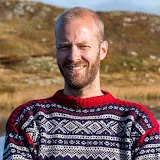0:00
Hi, I'm Paul from Oslo, Norway
0:03
And today is Thursday, or as the Vikings would say, Thor's Dager
0:08
The Day of Thor. So the Vikings spoke a language called Old Norse
0:14
This language is extinct today, but it sounded something like this. I think you're my Eke me kills
0:22
but my filia is that matur, that the harette t'r to me
0:25
till that eckin biter fail. And did you know that as an English speaker
0:30
you're using plenty of Viking words every day. Here are some examples
0:35
Husbandi. Husband. Kala. To call or cry out for someone. Ugly. Ugly
0:45
The Old Norse has had a huge influence on everyday English language
0:51
And why is that? To go back in time. Most of the languages spoken in Northern Europe are Germanic languages
0:58
originating from the ancient Germanic tribes that inhabited the area of Germania Eventually during the second and third century the Germanic language took different turns
1:11
evolving into West Germanic and North Germanic. During the early Middle Ages in Scandinavia, North Germanic had evolved into what is known as Old Norse
1:24
and in England, West Germanic had become Old English. To illustrate the difference between these two languages, let's take the word heathen
1:35
In Germanic, this was pronounced Heithana, but in Old English it became Hethen, and in Old Norse, Heithin
1:43
So people speaking Old English and Old Norse had a hard time understanding each other
1:52
But there was one factor that brought these two languages together, and that was the Vikings
1:59
The Viking Age goes from the late 700s up until the early 1100s At this time Scandinavian started to leave their homeland for adventurous enterprises As the Vikings were also farmers they were interested traveling to new land to raise crops in
2:17
and as merchants, they were interested in access to new trade towns. In the year 866
2:24
the first major invasion of England took place. This was a huge Danish Viking army, led by Ivar
2:31
the boneless. This initiated a period of large-scale plundering, but also of Danish settlement on
2:39
English soil. In 878, the Danes even got their own territory in England, known as the Dane law
2:48
which had the Danish legal system. Eventually, the kings from different kingdoms in England
2:55
took this area back, but it stayed heavily Danish in terms of population and customs
3:01
Later in the 900s there were also invasions from Norwegian Vikings such as King Olav Trygwason in 991 The results of these invasions was not just plundering by the Vikings but also a good amount of settling by these Nordic people into these English kingdoms
3:21
This ultimately led to intermingling and intermarrying between the peoples of England and Scandinavia
3:28
So naturally this led to the Old English language being influenced by the Old Norse
3:35
Here are some more examples of the first. samples of Viking words in everyday English
3:41
Anger. Anger. Anger. Anger. Ransaka. Rancac. Rancac. Okay. Okay. That's it for now. I posted a link below
4:03
with a list of English words with Old Norse origin. Also, subscribe to my channel and stay tuned for more videos about Norway and Scandinavia
4:14
Take care and hallebra


